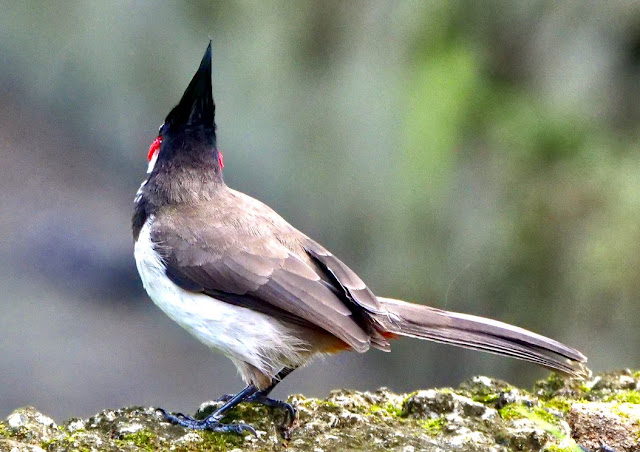This meditation on ‘Living inwardly’ is the fourth we shall consider in the weekly Friday Forum focussing on Life, Living and Learning.
Jesus of Nazareth spoke a parable about two men who went to pray, (Luk.18: 9-14), which suggests of the possibility of ‘Living Outwardly’! A Pharisee began his prayer, ‘I am not like other people; swindlers, unjust, adulterers, or even like this tax-gatherer. I fast twice a week, I pay tithes of all that I get’ (v 11,12). The Pharisee lived outwardly strictly following the rituals, ceremonies and traditions expected of him, but was full of himself and self-righteous. His prayer was like parading his good deeds to get justification before God.
But the tax-gatherer, ‘standing some distance away, was even unwilling to lift his eyes to heaven, but was beating his breast, saying, God be merciful to me, the sinner’(v.13). The tax-gatherer lived inwardly aware of his short comings and limitations and confessing his need for forgiveness and mercy from God. His prayer arose form his brokenness and confession. He had an orientation to live inwardly.
Let us explore this dimension of Living Inwardly. Jesus in John 8:31-32, made a significant revelation about this inwardness: ‘If you abide in my word, then you are truly my disciples and you shall know the truth and the truth shall make you free’. Let me explore the three key words in this passage :
Abide
Know
Free
Abide
There is one type of Orchid I notice in the teak trees in our garden. This species of Orchid, flowers as long as it is thriving on a teak tree. This orchid has no existence except by being attached to a tree trunk. Abiding is a way of living in contact or communion with God by the habit of Lectio Divina. Jesus made this even more clear in John 15:4, ‘Abide in me and I in you. As the branch cannot bear fruit by itself, unless it abides in the vine, so neither can you, unless you abide in me’. This is co-presence, God being present to us and ourselves present to Him.
In a fairly well known hymn of Henry Francis Lyte (1847), this human hunger to abide in God was explored well:
‘Abide with me, fast falls the eventide
The darkness deepens, Lord with me abide
When other helpers fail and comforts flee,
Help of the Helpless, O! abide with me
Swift to its close, ebbs out life’s little day;
Earth’s joys grow dim; its glories pass away
Change and decay in all around I see;
O Thou changest not, abide with me.
I need thy presence every hour
What but thy grace can foil the tempters’ power,
Who like thyself may guide and stay can be
Through cloud and sunshine, abide with me.
There is a similar longing expressed in Psalm 22:9-10. ‘Thou art He who did bring me forth form womb; Thou didst make me trust upon my mother’s breast; upon thee, I was cast from birth. Thou hast been my God from my mother’s womb’. It is when one abides in God, there can be an experience of communication from God.
This happened to Samuel (I Sam.3:1-21). Samuel was young and lived and served in the temple under the priest, Eli. One evening, when Samuel was asleep, he heard his name called to which he answered, ‘Here am I’. Samuel went to Eli to enquire if he had called. Eli had not called him. This happened two more times and each time Samuel went to Eli to enquire if Eli had called him. Eli having sensed that it was God who was calling Samuel told him to respond by saying, ‘Speak lord, for Thy Servant is listening’. Samuel heard the call the fourth time and a revelation came to Samuel from God about all that were to happen to Eli and concerning his sons (v 11-14). Samuel lived with an inward awareness of God in his life, which made him sense the voice that came to him in his sleep.
This co-presence, God being present to us and ourselves staying present to him is what gives the inward living reality. Apostle Paul, reminds us, ‘Do you not know that you are a temple of God and that the Spirit of God dwells in you?’ (ICor.3:16).
George Verwer in his book, Hunger for reality, made a strong pela for the followers of Christ to flee from a life of dichotomy by splitting our lives in two neat compartments, religious and secular (page5). Is our life a reflection of the true state of our inner selves! Is our outward life a ‘show’ for the benefit of others, whereas, we are far different inwardly from what we project to the outside world!
This has immense implication for our daily life. Jesus in the sermon on the Mount said;’ If therefore you are presenting your offering at the altar and there remember that your brother has something against you, leave your offering there before the altar and go your way; first be reconciled to your brother and then come and present your offering’ (Mat5:23,24). We ‘live, move and have our being in God’, whom the Psalmist describes as the One who knows, ‘even before there is a word on my tongue’ (Psam.139:4). Our inward life can be a sanctuary for God to dwell in, which is what makes our life sacred. An ongoing renewal would take place in our lives as we grow in this awareness of a God who ‘encloses us behind and before’.
2 Know
‘If you abide in my word, you are truly disciples of mine-you shall know the truth’ (John 8:31).
Pilate, who was trying Jesus publicly asked a question, ‘What is truth’? (John 18:38).
Having heard all the false accusations the Jewish leaders raised against Jesus, Pilate took time to examine the accusations and pronounced that ‘I find no guilt in Him’ (v 39). That was the truth that Pilate discovered about Jesus. But Pilate sought an attestation of truth from people around. As it was a custom to release a prisoner during the feast of the Passover, Pilate turned to the Jews who gathered in his chamber, ‘Do you wish then that, I release for you the king of the Jews’! People cried out, ‘Not this man, but Barabbas, who was a robber’.
Even Pilate had come to know the innocence of Jesus, him being the Messiah, the redeemer and the son of God. He had just heard Jesus say to him, ‘For this reason I have been born and for this I have come into the world to bear witness to the truth. Everyone, who is of the truth hears my Voice’ (v.37). It is because Pilate could not act on the truth even after discerning the truth, Jesus was crucified. Only some are able to discern the truth, as truth is often in ambush, concealed or scattered. Those who have the insights to know the truth are to be the advocates of the truth, making it easy for people to follow the truth. But having known the truth, Pilate fell short of pursing the truth to exercise it.
Truth has the risk of being usurped by untruth and displaced by public opinion. We have been through such an experience in connection with the presidential election in the United States of America. The president Mr Donald Trump had repeatedly asserted that the recently concluded election was a fraud and he was denied of his legitimate second term. Although with no evidence to justify his claim, he was able to influence a large number of his followers to believe his claim. A sad illustration of how truth is trampled upon and distorted, and untruth is made out to be the truth. In one sense truth is a mystery. How are we to know the truth!
In the story of two harlots coming to King Solomon to settle a dispute as to whose son was the living son, we get a perspective about the discerning process to find the truth (I Kings 3: 16-28). Both these woman had a son, the second woman having her son after three days of the birth of the son to the other woman. The first woman said to the Solomon, that the other woman who lost her son at night, placed her dead son beside her and took her son who was alive to herself. The second woman insisted that the living child was hers. Seeing that this quarrel could not be resolved, Solomon asked for a sword and ordered that the living child be divided in to two and give one half to one woman and the other half to the other woman. The woman who was the mother of the living child told the king, ‘Oh My Lord, give the other woman the living child and by no means kill him’ (v 26). But the second woman said; ‘He shall be neither mine nor yours divide him’ to which King Solomon said; ‘Give the first woman the living child, by no means kill him, she is his mother’.
It is by abiding in God’s word, we shall have the inner ambience to discern the truth from the untruth. The habit of Lectio Divina, is the habit of reading, recollecting and reflecting on the Scripture. Many learn passages of the Bible by heart and keep reciting them in order to refresh the mind and give the right orientation to thoughts, feelings and observations. The Scripture passages become the filter to screen and interpret the events in one’s life and in the world around. The silent prayer in the heart creates an ever-present God-consciousness. The passage in Psalm 119:11 helps us to reflect on this inner habit of living with a God orientation: ‘How can a young man keep his way pure? By keeping it according to Thy word. With all my heart I have sought thee; Do not let me wander from Thy commandments. Thy word have I treasured in my heart, that I may not sin against Thee’.
Lawrence Kohlberg (1927-1987) well known for his theory for moral development proposed pre-conventional, conventional and post conventional levels of conscience formation, each divided in to two stages. It is in late adolescent or early adulthood we develop an awareness of the universal principles of moral reasoning based on personal values. The strands that come together to create conscience driven approach to life, work, values, people and situations are drawn from early experiences in life. Most people choose to do the right thing in a given situation, because they believe that to be the right thing to do.
Our inward life has a light within us, which is what helps us to choose wisely and circumspectly.
A senior doctor once told me of his childhood experience at school. He was writing a competitive examination to compete for a merit scholarship. He was one among the few chosen to appear from his school. The school was expected to recommend one student who topped the examination to be considered for the scholarship. While writing the examination this senior friend saw another student drawing many diagrams in the answer sheet. Seeing this, he too drew diagrams which he was not planning to do earlier. When the result was announced he got the highest marks. My friend realized that he drew the diagrams because he saw another boy drawing them. It was almost equivalent to copying, according to him and requested the headmaster that another person be chosen from the school instead of him. The headmaster noticed that the next highest marks was earned by the boy whose diagrams reminded my friend to draw diagrams in the answer sheet. The headmaster recommended that boy and my friend from the school be given the scholarship. The headmaster wanted to acknowledge the honesty of a boy who confessed his ‘wrong-doing’ and desired to forfeit his first position.
When I heard the above story, I realized how truth is black and white and is not grey as portrayed often for convenience. However, this perception of truth is dependent on the sensitivity of the conscience and the moral threshold one keeps for oneself. It is not the external checks and balances which lead us in the path of truth, but an inner desire to live truthfully in all circumstances, because we are the followers of Jesus of Nazareth, who said, ‘I am the way, and the truth and life..’ (John 14:6). How blessed are those who make secret of their heart the truth! It is the way of life of those who can receive the words of Jesus, ‘Let not your heart be troubled, believe in God and believe also in Me’(john.14:1).
3. Free
The truth shall make you free (John 8:11). There is freedom in letting go and letting in.
I have watched young children play a game in the department ever since we had a jar of marbles, from which children could pick up one by one with their hand to play. The condition was not to empty the jar on to the floor, but only pick them. If they were to take a handful of marbles, the fisted hand would not come out of the mouth of the jar. I watched many children hesitant to let go of the fistful of marbles and struggle to take out their hand through the mouth of the jar. Those who would let go and pick up one or two marble each time would have the pleasure of playing with all the marbles. It looks like that the human instinct is to possess and not to let go.
To live free inwardly we need freedom form our Past, self-pursuit and Icarus syndrome.
Freedom from our past
Thomas Moore in his book, Life at work, wrote: ‘The past feels like a burden only when it is thick, solid and unsorted. You repeat the same stories; blame the same people and feel the same frustrations. If you can look more closely and tell the stories with a new detail and insight, the past loosens up. You see it in slightly fresh ways, and it is no longer a bothersome lump of emotion. It can become lighter to carry and even offer support for a new career, where before it was an obstacle’ (p57). Our past of disappointments, griefs, losses, embarrassment, anger, deceptions, etc are like a baggage which we carry, which becomes a weight upon our heart and a preoccupation from which we cannot free ourselves.
Let us revisit Joseph of the Old Testament to take a lesson in dealing with our past (Gen37:1-36). Joseph was the younger to all his brothers and was the favourite of his father and Jacob made him a varicoloured tunic, which infuriated his brothers(v3,4). Joseph had two dreams both of which he shared with his brothers and father, because of which his brothers hated him even more (v.5). So Joseph when he came to enquire of the wellbeing of his brothers when they were away looking after the sheep, his brothers pushed him into a pit and sold him to the Ishmalites. Joseph reached the palace of Potiphar finally and after a period of service, he was sent to the prison on account of a false accusation by Potiphar’s wife.
While in prison the cupbearer and baker, who too were in the prison, had a dream which Joseph interpreted. The cup bearer was restored to the palace and when Potiphar had two dreams, the cup bearer suggested to Potiphar that Joseph be invited to interpret the dreams which he did.
Following this, was the seven years of plenty and seven years of famine. Joseph was in charge of all that needed to be done to gather grain and keep a storehouse of it, to distribute during the season of famine. That was how all his brothers came to gather grain during the famine. Joseph recognised them and treated them kindly. Finally when the famine was over when his brothers on the advice of Jacob came to apologise for all that happened, Joseph had this to say:’ And as for you, you meant evil against me, but God meant it for good in order to bring about this present result, to preserve many people alive’ (Gen.50:20).
What a state of mind of openness, forgiveness and reconciliation! We can let go of our past from haunting us or allowing to reside within us to perpetuate the same milieu of turmoil, if only we can see our past as a formative experience in our lives, meant for our growth and enlargement.
Freedom from self-pursuit
The story of the prodigal son illustrates this vividly and poignantly (Luk. 15: 11-32). The younger son came to his father, ‘give me the share of the estate that falls to me’ (v12). The son having gathered everything he had (v 13) went on a journey to a faraway place. He lived there till a famine had hit the place and he was left with nothing to live on. He found the job of taking care of swine and filled his hunger with the pods the swine were eating.
When he came to his senses, he said to himself: ‘How many of my father’s hired men have more than enough bread, but I am dying here of hunger’(v17). That was when he went back to his father, saying, ‘I am no longer worthy to be called your son, make me as one of your hired men’(v 19). But his father having seen him coming home from a distance felt compassion for him, ran and embraced him.
This is a parable of revealing the danger of pursing after ambitions, personal plans, living indulgently, and living to devour all one can get in life. We need freedom from this too as this instinct resides in most of us in some form or other. To be so obsessed with oneself is also pathological.
Freedom from Icarus syndrome
The fable of Icarus has lot of truth for us to consider. He as a young man was fond of getting off the ground and flying high in the air. One day it got into his head to fly as high as the Sun. He turned to his uncle, Daedalus to make him a pair of wings. Daedalus made him beautifully crafted wings with wax and cautioned his nephew from flying too close to the Sun lest the wings would melt in the warmth of the Sun. Icarus full of spirit and ambition gave no thought to the limits his uncle warned him about and soared and reached for the sky and came too close to the warm rays of sun. The wings melted and down came Icarus crashing to the ground.
The Icarus syndrome is characterised by excessive self-regard, extreme self- consciousness and bloated self-image. Such a spirit shall push a person pursue for pose, image and fame. This then becomes a rat race. The football legend, Maradona, who passed away a few days ago, at the age of 60 years was a victim of Icarus syndrome. He had everything at his disposal but lived dangerously and irresponsibly, flooding himself with all the indulgences of life.
I am afraid, we see this form of self-propagation even among health care professionals. The way to be free from such a snare is to grow in a state of contentment because God is our sufficiency and He shall provide all that we need if we can stay faithful to our calling. To live freely inwardly, we need this trustful dependence in God.
Let me conclude. To live inwardly is a calling! It shall involve living restfully, thoughtfully and discerningly.
I am reminded of an incident in the life of a monk, who lived his contemplative life beside a stream. He was hospitable and invited people to have conversations with him. One day he was preparing his supper and cooking chapathi on the fire. A dog unnoticed by him took a chapathi and ran away. The monk with a spoonful of butter in his hand went after the dog. The onlookers thought that he was trying to rescue the chapathi and dissuaded him from going after the dog. But he replied to them, ‘The hot chapathi tastes better with butter on it. I was wanting to spread the butter on it for the dog to enjoy his meal’!
Life is for living with an inner consciousness of rest, peace and trust. Let our life be so anchored in God that we grow up to be generous and hospitable. That is the way of living inwardly!
M.C.Mathew (text and photo)

























